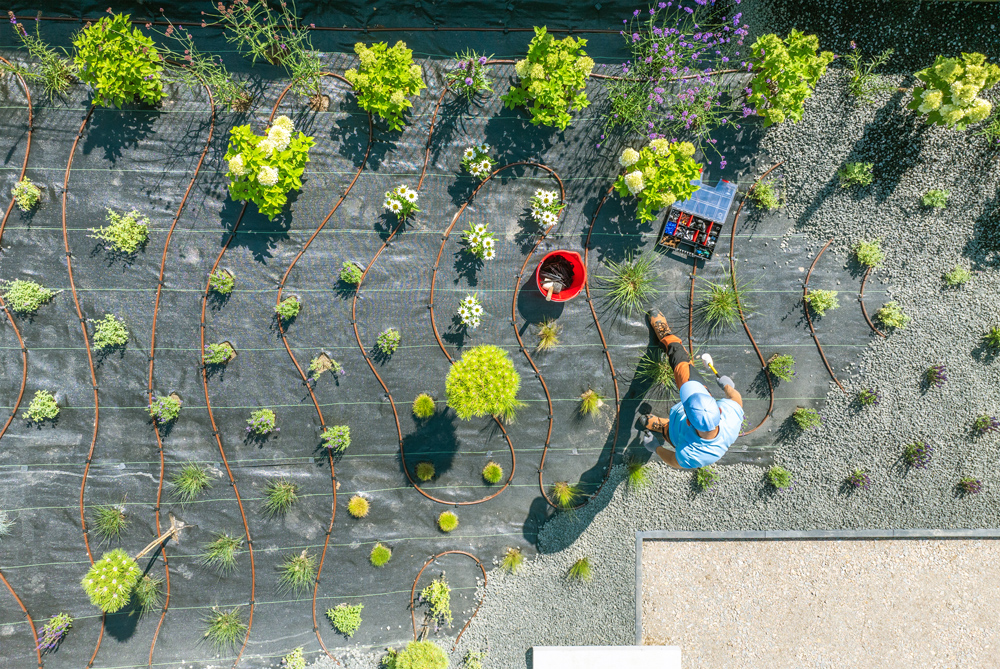
If you’re like most homeowners, you’re squeezing more out of your outdoor space but overlooking a key area: the front yard. We’ve packed our backyards with outdoor kitchens, play and lounging areas, firepits, and gardens. In the process, we’ve unintentionally missed out on front yard landscaping improvements. Both the numbers and the experts support the value of upgrading your front yard landscaping.
For starters, those improvements can add curb appeal and value to your home. More than half of homeowners — 57% — believe that beautiful landscaping and exteriors can increase a home’s resale value by at least $20,000, and 16% say the increase can be more than $50,000, according to a 2023 survey by Thumbtack and Nextdoor.
An outdoor landscape upgrade provides an estimated return of 100%, according to the National Association of REALTORS® 2023 outdoor “Remodeling Impact Report.” The survey defined an upgrade as adding a natural flagstone walkway, two stone planters, several flowering shrubs, a deciduous tree, and mulch.
“The front yard creates the first impression of your home,” says Janet Loughrey, a contributor to “Garden Design” and a garden photographer. “There are many ways to repurpose a front yard into a beautiful and functional space for relaxing, entertaining, or recreation.”
12 Ways to Upgrade Your Front Yard Landscaping
Here are ideas to inspire a new and improved view of your front yard:
#1 Spotlight the Front Porch
Potential home buyers rank the front porch as one of the top home features they want in their next home, according to a 2024 survey from the National Association of Home Builders. Showcase it as a place to relax or connect with neighbors by providing seating areas, such as Adirondack chairs, a bistro set, a lounger, or a porch swing, Loughrey suggests.
Embellish the porch with flowery hanging baskets and use potted flowers in bursts of color next to the front door to “guide people’s eyes to the core of the home and in providing a welcoming look,” says Jackie Mosher, co-founder of Dzinly, a Royal Oak, Mich.-based company that helps homeowners and real estate professionals digitally design exteriors.
#2 Play Up Pathways With ‘Entangled Design’
An on-trend front yard idea is to channel “entangled design” with grass in-between pavers. “Whether driven by aesthetic requests or as a byproduct of maintaining onsite drainage, we’re seeing increased interest” in this, according to the “2024 U.S. Houzz Home Design Predictions” report from the home remodeling site Houzz. The design offers a more natural look that softens up pathways by breaking up large expanses of a hardscape.
#3 Move the Firepit to the Front
Firepits aren’t just for the backyard. Homeowners are moving them to the front. Carve out an area that can be surrounded by a group of low shrubs or a stone wall feature. “Anytime you add height around a space of at least 24 inches tall, it provides a sense of containment and natural coziness,” Mosher says.
#4 Light Up Walkways
Add lighting along walkways for safety and nighttime ambiance. Accent both sides of the porch, for instance with boxed lanterns in a black or antique bronze, Mosher suggests. Use spotlights pointed up at the house to highlight the architecture and up-lights on your favorite plants or trees. (Tip: Use solar-powered spotlights to bypass extra wiring costs.) Also, hang an oversized hanging pendant or chandelier above the front door. Pick a fixture about one-third or one-fourth the size of the front door, including the trim, Mosher recommends.
#5 Decorate Window Boxes
Dress up your home’s colors and architecture year-round with boxes filled with seasonal flowers, fitted along the bottom ledge of outside windows. Use three different types of flowers: greenery, a taller plant in the center, and a colorful accent flower, Mosher says. Not every window needs a flower box. Maybe it’s just the large picture window or the windows on a second story, she notes.
#6 Consider Waterwise Landscapes
With water shortages growing, particularly in drier climates, more homeowners are ditching all-grass lawns. “We’ve seen many homeowners incorporate a mix of paving stones and artificial turf to create a clean, polished look that’s modern and easy to maintain,” says Aaron Brundage, landscaping expert and director of operations at System Pavers in Syracuse, N.Y.
There has been an uptick in xeriscaping, which is designed to reduce or eliminate water needs — for example, by using rocks, gravel, and native plants, reports The Plan Collection, a home and floor plan company. They are also seeing more wildscaping, focusing on native landscaping that creates a habitat for bees, birds, and small animals.
#7 Add a Get-Together Space
No front porch? No problem. You can still create a porch feel. Pave a stone courtyard to accommodate patio furniture and for entertaining, Brundage says. “A walkway with a small pergola creates an instantly inviting feel that will make guests feel welcome.”
#8 Balance Privacy and Curb Appeal
With a front yard, “there’s a desire for privacy, yet an opposing desire to allow some of the home’s architectural elements to remain visible from the street,” says Jeremy Martin, CEO at Willow Gates Landscaping in Mohnton, Pa. Decide on any areas you want to shield. To block car traffic, consider placing trees in the corner of the front yard. “This allows the home to remain visible, but the viewing window is so short that passersby really can’t observe many details,” he says. “If the primary need is privacy from foot traffic, a more continuous hedge may be needed. A fence may work, but in the front yard is often limited to three feet or four feet high by local codes and ordinances.”
#9 Get Creative With Front Yard Garden Ideas
Don’t just tuck everything into a front yard flower bed. Use vertical planters, especially for a vegetable or herb garden. Lush greenery can comprise a living wall, dressing up an otherwise ordinary wall and adding privacy. Metal trellises and arbors can add height to a landscape. For a welcoming front entrance, Loughrey says, consider a trellis or arbor covered with plant climbers like roses, clematis, or fragrant honeysuckle.
Spruce up a front yard garden by adding seating areas, like a bench. “These seating areas add dimension to a home and provide a charming look,” Mosher says.
#10 Incorporate Rocks (but Not Too Many)
River rocks or crushed gravel are lower maintenance alternatives to mulch. However, they’re pricier to install, don’t enrich the soil, and create a “hard” surface look, Martin says. Avoid using too much river rock and consider using plants with soft, flowing foliage, he adds. Also, boulders nestled within a landscape can “complement the home. “Boulders also work well to ease grade issues without using a block retaining wall.”
#11 Weave in Water Features
“Adding a water feature can boost curb appeal while bringing an upscale feel to front yard get-togethers,” says Brundage. “Water fountains also are great for blocking background noise, such as traffic or noisy neighbors.” You could install a large, two-tier fountain with cascading water as a focal point or incorporate a cast stone fountain as a small landscape accent. But think about added maintenance and electrical costs (the change could add $20 to $150 a month to household bills, according to Angi estimates. For low-cost options, consider solar-powered outdoor water fountains.
#12 Choose Plantings With Multiseason Appeal
“Choose plant varieties that have multiseasonal attributes such as colored leaves, flowers, berries, bark, and fall color,” Loughrey suggests. “Use evergreens and plants that bloom at different times for year-round color.”
Martin’s picks for trees: dogwoods, redbuds, and crab apples for their colorful blossoms. He also likes magnolias, such as the stellata (which tends to form as a large shrub rather than a tree, reaching about 15 feet tall); saucer magnolias (with vibrant colorful, spring blossoms); and the sweetbay magnolia, with fragrant, white flowers in the summer and large, red fruit in the fall.
Evergreens add greenery and privacy. Beware white pines and Norway spruce, though. They can reach up to 50 feet and overwhelm a yard, Martin says. Choose more compact varieties, like the Vanderwolf pine (about 20 feet tall); the Red Beauty (about six feet wide and 10 feet tall); the Dragon Lady (about 12 feet wide and 20 feet tall); and the Nellie Stevens and Thuja Green Giant (both up to 15 feet wide and 25 feet tall).
6 Front Yard Landscaping Mistakes to Avoid
We all want to avoid having to undo any landscaping missteps or living with an unhappy choice. Here are common mistakes and tips to steer clear of them:
- Overpacked design: “Too many features or sculptures can make a space feel chaotic,” says Joe Raboine, vice president of design at Oldcastle APG in Atlanta. Choose your focal area (for example, the front porch, the garden, or the firepit), and build your front yard around it.
- Too close to home: Avoid placing tall shrubs or trees near the home, Martin says. “This can lead to issues with walkways heaving, blocking light to windows, and leaves ending up in roof gutters.”
- Blocking views: Avoid tall continuous plantings across the entire front property boundary, Martin says. “While this may offer a private front yard, it often detracts from the home’s appearance. When it’s time to sell your home, you don’t want prospective home buyers to think they’re entering an overgrown jungle that will cost thousands of dollars to control.”
- Off-scale: “When adding plants, seating, water features, and accessories, keep them in scale,” Loughrey says. “A small bistro table and chairs are more in scale with a front yard than a large patio set, which is more suited for the back yard.”
- Too much of the same thing: Avoid solid hedges of a single plant. “If one plant in the hedge dies, it can be very tough to get a matching plant that’s a similar size,” Martin says. “A mixed hedge will be more forgiving and flexible in the long term.”
- Beware the rules: Check if your neighborhood’s homeowner’s association or city has any rules for lawns, structures, or other features that can be viewed from the street. Landscaping is costly to install; you don’t want to have to rip it out.
If you want to use every inch of your home’s outdoor space, give your front yard some extra love and attention. Your efforts will pay you back immediately with more beauty to look at and experience and prepare you for more curb appeal and returns when it’s time to sell.
Conclusion
When it comes to making a strong first impression, landscaping plays a major role in boosting a home's curb appeal—and ultimately, its value. Whether you're preparing to sell or just starting your search for the perfect property, a well-maintained yard can influence how quickly a home sells and how memorable it is to potential buyers.
As a real estate professional who understands the power of presentation, I guide my clients through smart, affordable ways to enhance their home's exterior so it stands out in today’s competitive market. From recommending trusted landscapers to offering tailored advice for your property, I'm here to help you maximize results every step of the way.
If you're thinking about buying or selling, let’s connect by clicking here to email me. Together, we can make your home’s first impression a lasting one.


